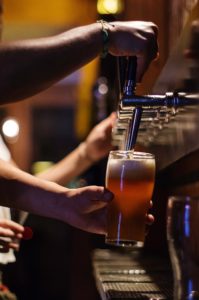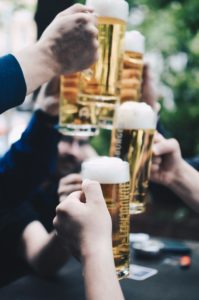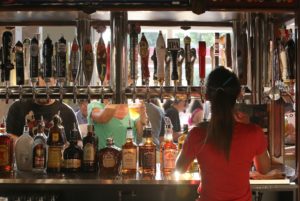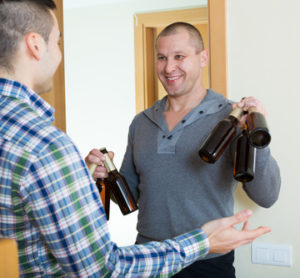 Ohhhh, the weekend.
Ohhhh, the weekend.
The time when you can finally let down and let go after a week of grind. Waking to the alarm clock day after day after day… Sitting in bumper-to-bumper traffic… Not once but twice a day…day in and day out.
Friday night? It’s time to PARTY!!
Meet your friends at your favorite place, talk, eat, laugh and knock back some cold ones. A drink or five.
Then, your gaggle of friends decides to move to another bar, and knock back a few more…. With some appetizers… Then one for the road… or three…
You wake up the next morning and don’t remember how you got home. Head splitting, can’t  see straight, drag into the kitchen and drink water, guzzle coffee…add your friend’s hangover remedy… then get on the phone to pull friends together to tie one on tonight…after all, it’s Saturday! Party baby!!
see straight, drag into the kitchen and drink water, guzzle coffee…add your friend’s hangover remedy… then get on the phone to pull friends together to tie one on tonight…after all, it’s Saturday! Party baby!!
Rinse, repeat.
And again Sunday night…
Monday, throw down coffee, stuff your pockets with Alka-Seltzer and head for work. Back to the grind.
One Way Alcohol Tears Down Your Life
A few years of this is just a continuation of your college lifestyle…but somewhere along the line the weekend binges overflow into Monday. Then the weekend starts early on Thursday…
After a couple more years, you think, “Why wait till the weekend? I’m an adult!” And you’re meeting a friend at the pub every night after work, then drinking at lunch…
And now? Well, your breakfast is no longer a beer, but vodka in a little orange juice. Lunch is Kentucky Honey…followed by Jack Daniels for afternoon tea.
The job? Performance has fallen way off, and you’ve got a file full of write-ups for missing  meetings, too many absentee days… and finally an ultimatum from your boss.
meetings, too many absentee days… and finally an ultimatum from your boss.
What started as fun outings with college friends, has now set your career on the brink of destruction.
What happened…? And what can you do?
Too Much Alcohol Too Often Leads to a Disorder
Well, for starters, you’ve unwittingly trained your brain and body to depend on that daily consumption of alcohol. It started out mild with a few beers, then rapidly accelerated to full-blown alcohol dependence. And the more you drank, the more you needed. You might just be a girl who loves her wine. Or you might have moved on to a new favorite. From beer to Jack Daniels at lunch, and from wine with dinner to Gray Goose instead of dinner.
This is called alcohol use disorder, and while it doesn’t happen to everyone, it does happen to 5% of the adult population of the world.
And it can lead to alcohol dependence, or addiction, just like heroin and cocaine use can lead to addiction.
2.9% of the US population is addicted to illicit substances.
The leading cause of accidental death in the US is drug overdose.
And it gets worse. For those who try to stop their addiction to alcohol, prescription or illegal drugs, the rate of relapse is between 40-80%.
Pretty grim.
For millions of people, the outlook has been bleak. Once that door is opened, it’s really tough to close it again.
close it again.
Outpatient Treatment for Addiction
Addiction treatment focuses on abstinence.
Stopping, staying away, never going back.
It’s so hard to do.
It’s hard for some people to even think about. But it’s the goal of treatment, and it’s the way to freedom.
Support is critical. AA or other 12 step programs, sponsors, a recovery coach, individual therapy, mindfulness practices, healthy living.
And perhaps medication that can help you NOT RELAPSE,
There have been two basic approaches to treating addiction with medication. Either to replace the substance with another one that’s less destructive, like methadone in opioid addiction, or use a medication that can enhance abstinence. There are lots of these.
For alcohol, there are medications that can reduce craving … and medication that will make you really sick if you do drink. For opiates, there are medications that can reduce cravings and completely block opioids from getting you high, like Suboxone, and medication like methadone offered in methadone clinics.
However, a recently published paper reviewed the work that’s been done with ketamine for treating substance use disorders and alcohol use disorder, otherwise known as alcoholism.
We don’t mean recent, we mean hot off the presses. In Neuropharmacology January 18, 2018, by lead researcher, Ivan Ezquerra-Romano, and his team of neuroscientists in the UK and Russia.
It’s a game-changing analysis of studies conducted to investigate the use of ketamine and how its specific characteristic actions impact recovery.
You may know that alcohol use disorder is a serious epidemic in Russia. One of the authors — E. Krupitsky — is a Russian neuroscientist who has contributed a large number of studies to this effort.
This paper reviews and evaluates the use of ketamine and in treating alcohol use disorder, cocaine use disorder, heroin use disorder going back as far as 1965 to the present.
Ketamine??
Let’s talk about some of the findings.
Is Ketamine a Treatment for Alcohol Use Disorder?
Early studies in the ’60’s and ’70’s identified the effects of ketamine and “psychedelic-type” experiences it induced, based on the size of the dose taken. These observations would later become important in the treatment of substance use and alcohol use disorders.
Neuroplasticity is Vital for Recovery
Later, it was discovered that addiction seemed to be accompanied by a diminished  transmission of signals through the brain cell connections, and reduced change-ability of brain cell organization.
transmission of signals through the brain cell connections, and reduced change-ability of brain cell organization.
To make improvements in our brain function, and our thinking, the brain must have the ability to change…to reorganize its cells. This ability to change and improve is called plasticity.
And since we’re talking about brain cells, or neurons, this is neuroplasticity.
It allows the brain to improve as you improve. For instance, if you drink alcohol regularly in larger and larger amounts, your brain cells change as a result. One thing that changes is the ability to transmit certain signals through the brain. The connections between these brain cells or neurons, break down, dwindle, and disappear.
When you decide you want to stop drinking excessively, and to be healthy and balanced again, you need those synapses to be replaced and restored…so your brain can change itself.
Ketamine treatment works to reverse those changes in synapses, and restore them. It helps new neurons to be formed and to grow, then to grow more synapse connections to proliferate transmission of signals all through your brain.
Ketamine Turbo Boosts BDNF
One of the actions ketamine achieves for growing those new neurons and synapses is that it turbo boosts BDNF– or brain-derived-neurotrophic-factor. BDNF is like a rich compost that helps neurons and synaptic branches not just grow, but explode with rapid branching and dense mushrooming of strong, healthy branches and connections. And it happens FAST.
This transforms the function of your brain for a brighter mood and stronger sense of yourself.
When your brain’s communication network becomes more prolific and dense, you feel better, think better, have a brighter outlook. As a result, you feel capable of solid decisions.
Alcohol use disorder and substance use disorders are usually accompanied by depression. So, ketamine’s growing reputation for relieving depression is a strong adjunct to its therapeutic properties for addiction. By relieving depression, ketamine ramps up the strength of resolve in the patient to remain sober for a longer period of time.
Traditional antidepressants have no ability to reduce drinking — studies have shown this. And if you feel depressed, that’s a big trigger for relapse. Ketamine’s ability to produce a bright outlook and hope for the future can equip you to abstain from alcohol.
a big trigger for relapse. Ketamine’s ability to produce a bright outlook and hope for the future can equip you to abstain from alcohol.
Add to that the characteristics of ketamine’s rapid onset of beneficial actions, and the high success rate it boasts for relieving depression. Well, you can see the broad advantages it presents for relieving addiction, too.
Mystical and Dissociative Aspects
Another aspect of ketamine’s therapeutic prowess in treating alcohol use disorder and addictions of all kinds seems to be in the “mystical” and dissociative experiences it can produce.
Now stay with me. I know this sounds like we’re going off the road here, but think about it.
We know ketamine was abused as a club drug in the 1990’s and in some parts of the world is still the focus of serious abuse problems. Those who use it on on the street to get high use massive doses, and their drug seeking can quickly get out of control. Even when they think they’ve got it all under control.
At the same time, it’s listed on the World Health Organization’s List of Essential Medicines. So it’s a two-sided coin.
We continue to see that when it’s applied in the hands of non-professionals for the sake of the “mystical” experiences, it’s overused, overdosed, and damaging. However, in the hands of well-trained, deeply experienced psychiatrists for psychiatric treatment, its innate characteristics can work miracles.
In addition, we know that ketamine has the ability to provide certain experiences that feel like out-of-body experiences. Moments with insightful, profound thoughts… and for many people… deep, or spiritual, or almost mystical experiences. The type of experience is determined by the size of the dose. Keep in mind, in psychiatry, we still use very small doses.
Ketamine – Outpatient Treatment for Addiction
We’ve talked before about how it’s actually important that you experience a touch of this during the infusion treatment. And here’s why.
Because it seems that when you experience a bit of this, it’s because ketamine is at work rebuilding your neuron connections. The two seem to go together like a spark and fire. One is necessary for the other to occur.
Patients find these moments to be pleasant, floaty, happy moments.
In our office, we’re very precise about the dose you receive, and carefully control the speed. We curate the experience. We want your treatment to be effective. Therapeutic. Not overwhelming.
We curate the experience. We want your treatment to be effective. Therapeutic. Not overwhelming.
But what researchers have found in terms of addiction treatment is that these deep experiences during treatment are not just associated with improvement.
They seem to be critically important for achieving and maintaining abstinence.
Wow.
Ezquerra-Romano points out that the dissociative experience, mystical moments, enhanced introspection, and boosted empathy during ketamine treatment prove to be psychologically advantageous in the long-term. Experiences like this tend to achieve wonderful outcomes.
And patients describe life-changing, eye-opening, and spiritually meaningful events from their treatments.
As a result, they report catharsis, improved relationships, improved self-awareness, and personal growth.
We can see it.
Ketamine – and Its Mystical Experiences – Reduced Cocaine Use Without Rehab
E. Dakwar, et al., whose studies provided important information for this paper, published ground-breaking findings in his work with cocaine use disordered subjects in 2016. His work included subjects who had no interest in detoxification or recovery. After ketamine treatment, they reduced their cocaine use by 67%. Unheard of success before ketamine.
These subjects had no desire to stop using cocaine, and received no psychotherapy or counseling. Only ketamine treatment.
Amazing.
What’s more, the mystical experiences during ketamine treatment increased their motivation to stop using cocaine within 24 hours.
Unheard of.
Since counseling for alcohol use disorder and other addictions includes development of respect for others, a deeper self-awareness, and often recognition of a greater power, ketamine treatment may be able to help patients achieve these goals more quickly and deeply because of the dissociative experience that occurs during the treatment.
In these studies, these experiences and the growth and revelations they produced were seen as favorable by researchers and their subjects. The patients felt more upbeat, less anxious, and more self-confident … in fact, they were able to open up emotionally more than they had before.
It’s possible that these therapeutic experiences help patients lay the groundwork for, adjust to, and accept, a “sober lifestyle.”
Letting Go of “The Party Lifestyle”
If you struggle with an alcohol use disorder, you know how difficult it is to imagine life without all that goes with alcohol. The bars … the friends … the activities … the stories. There is the physical dependence on alcohol, but there’s the psychological and emotional dependence on a lifestyle that’s familiar.
You may be able to see that an aspect of ketamine treatment that helps you move on to accepting and even embracing a sober lifestyle could play a huge role in your recovery. It’s not the whole picture … but it could be part of it.
Something that we in medicine need to think about, is whether ketamine’s dissociative effects are really adverse side effects. The literature is full of caution about this — as though it’s something that you don’t want — and it’s been mentioned as a reason to avoid ketamine treatment.
Some call the dissociative effects of ketamine “psychedelic” and try to assert they aren’t necessary for ketamine’s antidepressant and  anti-addictive actions. And … they work on developing cousins of the compound to avoid these effects.
anti-addictive actions. And … they work on developing cousins of the compound to avoid these effects.
But, a mountain of studies described by Ezquerra-Romano and his colleagues herald the value of these side effects in treating addicts and helping with their psychological healing. They urge doctors to speak of these therapeutic effects of ketamine in a positive light.
The real need is to remove the stigma associated with these experiences, and encourage more research.
My Position about Ketamine for Addiction Treatment
And I agree. This is a time when real solutions for alcohol use disorder and opioid use disorder have been difficult to come by. A time when we know that alcohol and substance abuse treatments have relapse rates as high as 40-80% within the first year. We need more research. Better solutions. New science. We need to understand how enhancing neuroplasticity can change someone’s life.
It’s time to look beyond the tired same-old, same-old and help people get well.
If you struggle with alcohol or other substances, and it’s interfering with your life in a serious way, call us. Or contact us here. Or email us at info@loricalabresemd.com.
At Innovative Psychiatry, we see 80% recovery and even remission in our patients with treatment-resistant depression.
And we see surprisingly good results with ketamine in our patients who struggle with alcohol, stimulants, cocaine, and opiates … even in our patients on methadone. They come to us with depression, and they often walk out with much less craving — or no craving at all.
We didn’t know if we could believe it. Didn’t know what to make of it. Weren’t sure if it was a placebo effect. But there’s a host of excitement in the research community, plus new research in progress, to explore this potential treatment for alcohol and other substance use disorders. The field is exploding.
It’s about time.
You can turn your life around and set it on solid ground. You just need some help. And that’s what we’re here for.
 To the restoration of your best self,
To the restoration of your best self,

Lori Calabrese, M.D.